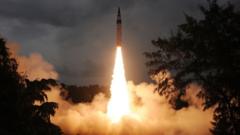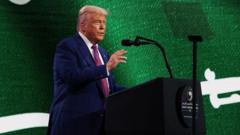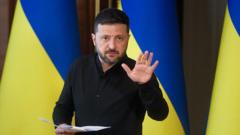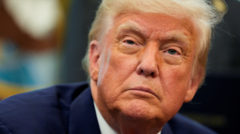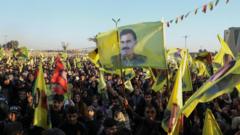In a recent briefing, Ukrainian President Volodymyr Zelensky announced his intention to travel to Turkey for potential direct talks with Russian President Vladimir Putin, aiming to facilitate peace efforts amid ongoing conflict.
Zelensky Commits to Pursuing Direct Dialogue with Putin in Turkey
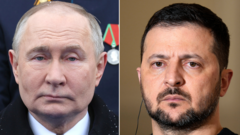
Zelensky Commits to Pursuing Direct Dialogue with Putin in Turkey
Ukrainian President emphasizes the importance of face-to-face negotiations as tensions persist.
Zelensky revealed plans to visit Ankara to meet with Turkish President Recep Tayyip Erdogan and expressed his readiness for discussions in Istanbul on Thursday. "We will do everything to ensure that this meeting takes place," he stated, urging for Russia to respond positively to his overtures.
While details concerning Putin's attendance remain undisclosed, Kremlin officials indicated that an announcement would come "when [Putin] deems it necessary." This upcoming meeting marks the first opportunity for the two leaders to converse since their encounter in Paris in December 2019.
The last round of direct negotiations occurred in March 2022 during the early days of Russia's full-scale invasion of Ukraine. Initially, Putin had expressed a desire for talks in Istanbul "without pre-conditions," prompting Zelensky to confirm his travel plans and expressing hope for Putin's participation.
Zelensky's announcement is seen as an attempt to increase pressure on Moscow. However, the Kremlin has countered that such pressure is "useless," emphasizing a need for considerations that address what they term the "root causes" of the conflict, which Kyiv has consistently rejected.
The Ukrainian president highlighted his priority of achieving a 30-day ceasefire, a proposal he claims aligns with the interests of Ukraine's allies, including the United States. Zelensky expressed skepticism regarding Putin's suggestion of talks, interpreting it as a tactic to undermine Ukraine's response.
Despite speculation about U.S. involvement in the negotiations, including potential travel by President Biden, reports indicate that envoys Steve Witkoff and Keith Kellogg may represent the U.S. in Istanbul. The Kremlin, however, downplayed the likelihood of an in-person summit with Putin.
Amidst these discussions, Russian officials reiterated their stance on pre-invasion conditions for negotiations, which have been seen as ultimatums by Ukraine. This has led EU officials to publicly support the idea of direct talks while questioning whether Putin would agree to meet.
Ukrainian leadership has conveyed urgency regarding the need for peace, with Zelensky's chief of staff indicating that a refusal by Putin to attend would signal a lack of genuine interest in resolving the conflict. Allies of Ukraine have issued warnings of potential sanctions if Moscow fails to agree to a ceasefire.
The European Union is reportedly preparing further measures in response to the situation, emphasizing the ongoing tensions as the search for resolution continues.
As both sides navigate this complex landscape, the potential for dialogue hangs in the balance ahead of Thursday's meetings.
While details concerning Putin's attendance remain undisclosed, Kremlin officials indicated that an announcement would come "when [Putin] deems it necessary." This upcoming meeting marks the first opportunity for the two leaders to converse since their encounter in Paris in December 2019.
The last round of direct negotiations occurred in March 2022 during the early days of Russia's full-scale invasion of Ukraine. Initially, Putin had expressed a desire for talks in Istanbul "without pre-conditions," prompting Zelensky to confirm his travel plans and expressing hope for Putin's participation.
Zelensky's announcement is seen as an attempt to increase pressure on Moscow. However, the Kremlin has countered that such pressure is "useless," emphasizing a need for considerations that address what they term the "root causes" of the conflict, which Kyiv has consistently rejected.
The Ukrainian president highlighted his priority of achieving a 30-day ceasefire, a proposal he claims aligns with the interests of Ukraine's allies, including the United States. Zelensky expressed skepticism regarding Putin's suggestion of talks, interpreting it as a tactic to undermine Ukraine's response.
Despite speculation about U.S. involvement in the negotiations, including potential travel by President Biden, reports indicate that envoys Steve Witkoff and Keith Kellogg may represent the U.S. in Istanbul. The Kremlin, however, downplayed the likelihood of an in-person summit with Putin.
Amidst these discussions, Russian officials reiterated their stance on pre-invasion conditions for negotiations, which have been seen as ultimatums by Ukraine. This has led EU officials to publicly support the idea of direct talks while questioning whether Putin would agree to meet.
Ukrainian leadership has conveyed urgency regarding the need for peace, with Zelensky's chief of staff indicating that a refusal by Putin to attend would signal a lack of genuine interest in resolving the conflict. Allies of Ukraine have issued warnings of potential sanctions if Moscow fails to agree to a ceasefire.
The European Union is reportedly preparing further measures in response to the situation, emphasizing the ongoing tensions as the search for resolution continues.
As both sides navigate this complex landscape, the potential for dialogue hangs in the balance ahead of Thursday's meetings.

